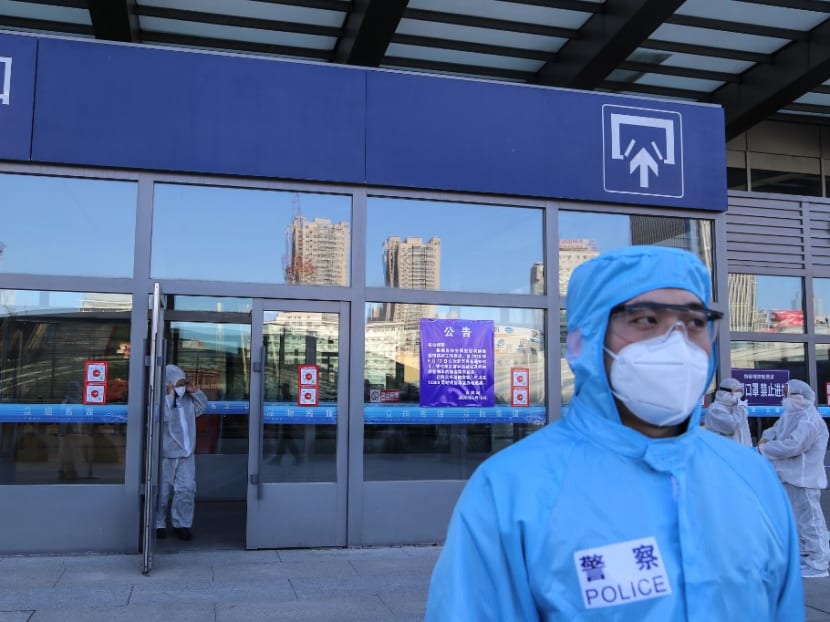Warnings of second wave of Covid-19 infections as China fights ‘long-term war’
HONG KONG — China is battling to contain a coronavirus cluster in the country’s northeast with strict lockdowns amid warnings of a potential second wave of cases as the country fights a “long-term war”.

Police officers clad in protective suits stand guard outside Jilin city's railway station in China's Jilin province.
HONG KONG — China is battling to contain a coronavirus cluster in the country's northeast with strict lockdowns amid warnings of a potential second wave of cases as the country fights a "long-term war".
Two new cases of local transmission were confirmed in Jilin province on Sunday (May 17), bringing the total number in the cluster to at least 34 — all of them linked to a woman who tested positive in the city of Shulan on May 7. Before that, the province had not reported any local cases for 73 days. Neighbouring Liaoning has also reported three cases connected to the outbreak.
In Shanghai, a case of local transmission was also confirmed on Sunday — the first there since March 23. The patient, from Hubei province, had travelled to Shanghai on Thursday and tested positive before symptoms developed.
The numbers are low compared to the outbreak in Wuhan, where the first cases were reported in December before the deadly virus rapidly spread across the country and the world. More than 83,000 people have been infected in China, with over 4,600 killed.
But the new cases have set alarm bells ringing as the country tries to reopen, having been clear of local transmission for weeks after months of strict measures to curb the contagion.
Mr David Hui, chairman of the medicine and therapeutics department at Chinese University of Hong Kong, said there was a risk of a second wave on the mainland.
"There have been new cases in Heilongjiang, Jilin and Wuhan, and there was another case going from asymptomatic to symptomatic infection in Shenzhen two weeks ago," Mr Hui said. "So it is important to watch out for a second wave on the mainland. The asymptomatic cases still carry high viral loads and are infectious."
While strict lockdown measures in China's outbreak epicentre Hubei province helped break the chain of local transmission, people in cities like Wuhan could be vulnerable to a second wave of infections because there is a low level of antibodies in the population. A study of 11,000 residents of Wuhan in April found that 5 to 6 per cent tested positive for coronavirus antibodies, Caixin reported last week.
"Lots of people in China have no background immunity and would be at risk if there is a second wave," Mr Hui said.
Leading respiratory specialist Zhong Nanshan, a senior medical adviser to the Chinese government, told CNN that China still faced the "big challenge" of a potential second wave of Covid-19 outbreaks.
"The majority of … Chinese at the moment are still susceptible to the Covid-19 infection, because [of] a lack of immunity," Dr Zhong said in the interview on Saturday. "It's not better than the foreign countries I think at the moment."
Shulan, a city of 700,000 people in the country's northeast where the latest cluster has been traced to a 45-year-old laundry worker but the source of the infection is still unknown, began "the strictest" lockdown on Monday at noon.
One person per household can leave their home every two days, for two hours at a time, to get supplies. And residential areas where there are confirmed or suspected cases have been sealed off, meaning no one can leave and supplies must be delivered.
In nearby Jilin city, a partial lockdown is in place on its population of more than 4 million, with restrictions on transport and schools closed indefinitely.
Visiting the northeast last week, Vice-Premier Sun Chunlan — who spent more than three months supervising the response to the outbreak in Wuhan — had demanded more decisive and effective measures to prevent the situation from worsening.
Six officials were removed from their posts over the northeast outbreak at the weekend, including Mr Liu Shijun, deputy director of Jilin city's health commission, and Shulan's Communist Party chief Li Pengfei.
Ms Wang Bin, a senior official with the National Health Commission, said the situation was serious.
"China is facing an increased risk and extra pressure on prevention and control work because of … the situation caused by imported cases due to the spread of the pandemic overseas, as well as the cluster outbreaks in some areas," Ms Wang said on Sunday.
The cases in Shulan and Jilin showed there were still weak areas in the country's epidemic prevention and control efforts, she added.
Ms Wang said the new infections were a result of more relaxed measures taken by those managing overseas travellers and isolation facilities. She said more testing was needed, especially for people more likely to be exposed to virus carriers.
Mr Fu Chen, director of the Shanghai Centre for Disease Control and Prevention, warned that measures to contain the virus would have to be enforced for a long time to come.
"With the global pandemic still developing and local cases appearing in some parts of the country, it can be said that the prevention and control situation is still complicated and there are many uncertainties," Mr Fu said on Monday. "It is necessary to be prepared [to fight] a long-term war." SOUTH CHINA MORNING POST






